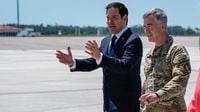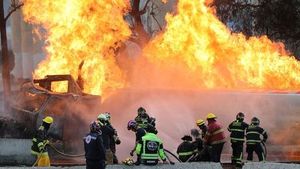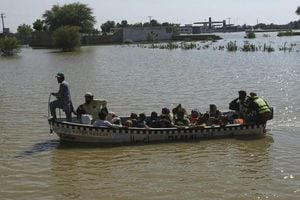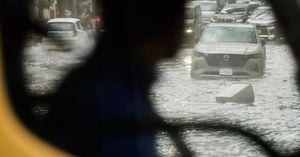In a dramatic escalation of tensions between Washington and Caracas, the United States has deployed military forces to the southern Caribbean Sea, targeting what it claims are Latin American drug cartels linked to Venezuelan President Nicolás Maduro. The move, confirmed by US Secretary of State Marco Rubio on August 14, 2025, marks a significant intensification of American efforts to curb narcotics trafficking in the region—and has prompted Venezuela to mobilize millions of militia fighters in response.
According to Brasil de Fato, Rubio announced that air and naval units would be dispatched to intercept drug shipments, framing the operation as a necessary step to protect US communities from the “poison” of imported narcotics. “These are groups that are operating with impunity in international waters, simply exporting to the United States poison that is killing, that is destroying communities… The Cartel de los Soles is one of the largest criminal organizations that exist in the hemisphere, which unfortunately has not been given enough attention. It is a cartel that today is indicted in the federal courts of the United States. It is not a government, the Maduro regime is not a government, it is a criminal organization,” Rubio stated, doubling down on the White House’s narrative that Maduro himself leads the so-called Cartel de los Soles.
The US State Department had, just weeks earlier on July 25, officially classified the Cartel de los Soles as an international terrorist group. Yet, as Al Jazeera and other outlets noted, the US has not publicly presented evidence substantiating claims that Maduro is at the helm of the cartel. Despite the lack of proof, the US administration recently doubled the reward for information leading to Maduro’s arrest to $50 million—a move that Venezuelan officials have derided as both “immoral” and “a ridiculous political propaganda operation and a joke,” according to Foreign Minister Yván Gil.
The military aspect of the US response is no less formidable. As reported by Reuters and relayed by Al Jazeera, three guided-missile destroyers—the USS Gravely, USS Jason Dunham, and USS Sampson—are expected to arrive off Venezuela’s coast within days. Around 4,000 sailors and Marines are joining the deployment, which is part of what Rubio described as a broader crackdown on cartels considered terrorist organizations by the US government.
This show of force has not gone unnoticed in Caracas. On August 18, President Maduro announced in a televised address that he would activate a “special plan” to mobilize more than 4.5 million militia fighters across Venezuela’s national territory. “This week, I will activate a special plan with more than 4.5 million militiamen to ensure coverage of the entire national territory – militias that are prepared, activated and armed,” Maduro declared, vowing to provide his supporters with “rifles and missiles” to defend the country’s sovereignty. The Venezuelan militia, established by former President Hugo Chávez, is officially said to have around five million members, though analysts suggest the real number is lower. With a national population of about 30 million, the scale of the mobilization is nonetheless striking.
Maduro denounced what he called the “extravagant, bizarre and outlandish threats” from Washington, dismissing the US rhetoric as a “rotten refrain.” He also expressed gratitude for international voices opposing the US stance, highlighting support from Mexican President Claudia Sheinbaum, who earlier this month rejected US allegations linking Maduro to Mexico’s Sinaloa Cartel. “Her government had no evidence of such ties,” Al Jazeera reported.
Meanwhile, the Venezuelan government has faced its own security threats. On August 12, Interior Minister Diosdado Cabello announced the demobilization of an attempted attack against strategic structures within Venezuela. According to Brasil de Fato, explosives capable of hitting targets up to 1.2 kilometers away were seized; these were allegedly intended for attacks on hospitals, gas stations, political figures, and the Venezuela Plaza in downtown Caracas. The Monument to the Victory of the Great Patriotic War against Nazism—an important memorial inaugurated earlier this year—was reportedly among the intended targets. Cabello blamed the plot on far-right sectors working in conjunction with paramilitaries.
For many within Venezuela’s military establishment, the US deployment is seen less as a prelude to outright invasion and more as a calculated display of power. Venezuelan military sources told Brasil de Fato that while they have not ruled out any possibility, they interpret the dispatch of US planes and ships primarily as a threat and a form of pressure. Henry Navas Nieves, head of the Master’s program in Military History at the Bolivarian Military University of Venezuela, suggested that the US has shifted away from direct armed interventions since the costly wars in Iraq and Afghanistan. “Since Obama, a new model of US warfare against expanding countries has emerged. They have abandoned direct armed confrontations and learned that it was possible to overthrow Muammar Gaddafi in Libya without deploying any soldiers. And they apply and replicate this. The use of their own military forces is inconvenient in these cases, and they resort to harassment and unilateral coercive measures,” Navas told Brasil de Fato.
In this context, the Venezuelan government argues that it has actually made significant strides against drug trafficking and far-right paramilitaries. Defense Minister Vladimir Padrino López emphasized that criminal groups like the Aragua Train have been “completely dismantled.” Still, the US continues to ratchet up pressure, with Attorney General Pamela Bondi claiming that more than $700 million in Maduro’s assets—ranging from mansions to cars, planes, and jewelry—had been seized, though she provided no evidence or details about the assets’ locations.
The escalation appears to be fueled not only by international concerns but also by domestic political calculations in the US. According to Navas, the intensifying rhetoric and actions are partly the result of a struggle between conservative factions within the United States, with Rubio’s group seeking to bolster its base, especially among the Latin American far-right community in Florida. “There is a mosaic of interests in the US vying for space and seeking to control the White House’s political decisions. Rubio leads one of them, and he is putting pressure on the government to launch an offensive against Venezuela in an attempt to overthrow the government. This is an escalation and a response to the Maduro government’s advance, which has seen significant victories in the recent regional, legislative, and municipal elections,” Navas commented.
Opposition figures in Venezuela have seized on the moment as well. Former congresswoman María Corina Machado, a prominent critic of Maduro, thanked the US president for “pressuring to defeat this criminal organization.” Yet, the Maduro administration remains defiant, with the president warning that any further US advance could mark “the beginning of the end of the American empire.”
As military hardware gathers off Venezuela’s coast and both sides ramp up their rhetoric, the standoff has become a test of wills—one with profound implications not only for the two countries but for the broader region. The next moves by Washington and Caracas will be watched closely, as the world waits to see whether this war of declarations will give way to something far more dangerous.




